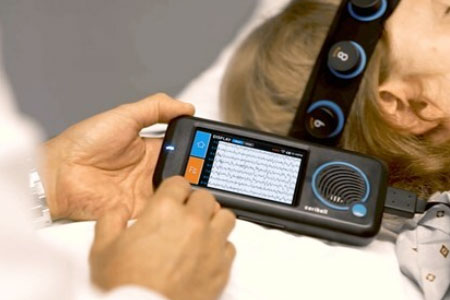Ceribell, Inc., a commercial-stage medical technology company focused on transforming the detection and management of patients with serious neurological conditions, announced the publication of results from a new multi-center retrospective study of patient outcomes following use of the Ceribell system compared to conventional electroencephalography ("EEG").
Study findings associated the use of Ceribell with a significant reduction in length of stay in the ICU, fewer patients discharged with poor functional disability scores, and - as expected - faster door-to-EEG time compared to conventional EEG.1 The study was published in Neurocritical Care, the journal of the Neurocritical Care Society.
"Ceribell use is associated with shorter stays in the ICU and better functional outcomes, which are extremely impactful benefits to patients and their families," said principal investigator Masoom J. Desai, MD, FACNS, Assistant Professor, Department of Neurology at the University of New Mexico School of Medicine.
Key findings based on study objectives:
4.1 days shorter median ICU length of stay with Ceribell vs. conventional EEG
18 percentage point decrease in the rate of patients discharged with poor modified Rankin Scale scores (an indicator of functional disability) when patients were assessed with Ceribell vs. conventional EEG
19 hours faster median time to EEG acquisition with the Ceribell System; 5.9 hours with Ceribell vs. 25.3 hours with conventional EEG
The study is a propensity score matched sub-analysis of 283 patient records from the SAFER-EEG trial, a retrospective study of adult patients monitored with EEG during a hospital stay. The publication adds to a robust body of research highlighting the significant delays to conventional EEG across hospitals in the U.S. and validates the clinical and economic benefits of the Ceribell system for the detection of non-convulsive seizures and management of patients at risk of non-convulsive status epilepticus in the acute care setting.
"These study results underscore the critical need for early assessment with point-of-care EEG, and the ability for providers to improve patient care while reducing length of stay and strain on hospital personnel through use of the Ceribell system," said Jane Chao, Ph.D., Ceribell Co-founder and Chief Executive Officer. "The meaningful association between frontline access to Ceribell's point-of-care EEG and improved patient outcomes will continue to drive our commitment to revolutionizing neurodiagnostics."
The primary SAFER-EEG study was conducted at 4 top-tier academic hospitals in the United States. Results were recently published in Neurology,2 and demonstrate that Ceribell point-of-care EEG performs comparably to conventional EEG in forecasting seizure risk for acutely ill patients using the 2HELPS2B score.
Contact us to schedule a demo and experience how Ceribell point-of-care EEG transforms patient care.
About the Ceribell System:
The Ceribell system is a novel, point-of-care EEG platform designed to address the unmet neurodiagnostic needs of patients in the acute care setting. By combining proprietary, highly portable, and rapidly deployable hardware with a sophisticated AI-powered algorithm, the Ceribell system enables rapid diagnosis and continuous monitoring of patients with neurological conditions. The Ceribell system is FDA 510(k) cleared for indicating suspected seizure activity and currently utilized in intensive care units and emergency rooms across the U.S. The Ceribell system received two FDA Breakthrough Device Designations in 2022, and in 2023, the latest generation of Ceribell's AI algorithm (Clarity™) made it the first and only device to receive 510(k) clearance for diagnosing electrographic status epilepticus. Subsequently, the Clarity algorithm received a New Technology Add-on Payment (NTAP) from the Centers for Medicare and Medicaid Services (CMS).
For more information, please visit www.ceribell.com


